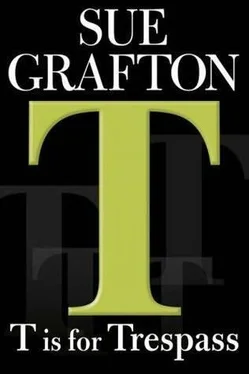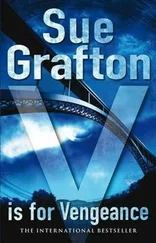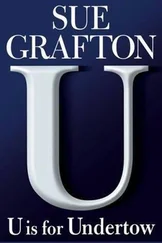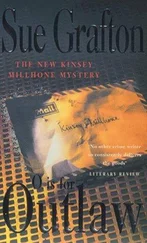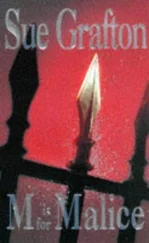At the corner, I waited for the light to change and crossed Capillo to the shops and specialty businesses lined up in a row on the far side of the intersection. I wandered through a craft mart, a drugstore, and a gift-and-card shop, all without success. I returned to my car and sat there wondering if I was completely off base. I’d been encouraged by Vernon Waibel’s assertion that Melvin was still in town, but I had no real reason to believe it. It made me happy thinking I could run him to ground through sheer tenacity, a trait I’ve been blessed with since birth. More to the point, if he’d fled into the world at large, I had no idea how to find him. Better to believe he was still in range.
I started my car and backed out of the slot. I took a right turn onto Capillo and then a left at the light. This put me back on Palisade, moving past a residential neighborhood of small wood-and-stucco homes built in the 1940s. On my right, a road snaked up the hill to houses of a loftier nature with spectacular ocean views. I slowed at a set of crosswalks. A crossing guard watched with care as a string of children made their way from the near corner to the one on the other side. They walked in twos, holding hands, while a teacher and a teacher’s assistant hurried them along.
When the guard nodded that traffic could proceed, I followed the slope of the hill down to the beachside park below. I did a slow circle of the parking lot, taking in the smattering of people I could see. I came out of the lot and turned right again, climbing the hill to the more populated section of Palisade I’d cruised before. How much gas was I willing to burn in the hope he was here?
I drove back to City College and parked in range of the bus stop on the same side of the street. For a while I sat, directing my attention to the campus across the way, the child care center on the near corner, and the block of apartments built into the side of the hill. After thirty unproductive minutes, I started the car again and took a left on Palisade. I’d make one last pass before I gave it up for the day. I reached the end of the imaginary territory I’d assigned to my quarry. At the beach park, I made the turn-around and drove back up the hill to the main intersection. I was stopped for a red light when I spotted him a hundred yards away.
Recognition is a complex phenomenon, a nearly instantaneous correlation of memory and perception, where the variables are almost impossible to replicate. What do we note in one another on sight? Age, race, gender, emotion, mood, the angle and rotation of the head; size, body type, posture. Later, it’s difficult to pinpoint the visual data that triggers the “click.” I was once at a departure gate in Chicago’s O’Hare Airport when I caught sight of a man in profile striding through the terminal in a jostling crowd of pedestrians. It was a split-second image, like a stop-action photograph, before the passengers shifted, blocking him from view. The man I’d seen was an officer I’d trained with as a rookie on the force. I barked out his name and he whipped around, as amazed as I was to spot a known face in unfamiliar surroundings.
I’d talked to Melvin once, but seeing his walk and the set of his shoulders created a response. I yelped in surprise, my gaze flicking to the stoplight. Still red. When I looked back, he was gone. I blinked, my gaze moving rapidly from one side of the street to the other. He couldn’t have gotten far. The second the light changed and I saw a break in the oncoming traffic, I made a left-hand turn and slid into the alleyway that ran behind the stores. No sign of him. I knew I was right. I’d seen the white hair and the cracked brown bomber jacket in my peripheral vision.
I circled back to the main intersection and began a grid search, mentally dividing the block into smaller sections that I could survey in slow motion. Back and forth I went. I didn’t think he’d seen me because he’d been facing the opposite direction, a man on a mission, shutting out all else. At least I’d narrowed the hunt. I continued at a crawl, the drivers behind me merrily beeping their horns in encouragement. I was talking to myself by then, saying, Shit, shit, shit. Come on, Downs, show your face again just once.
After twenty minutes I gave up. I couldn’t believe he’d vanished. I could have parked my car and done another foot search, but the idea didn’t seem productive. I’d return on Thursday and do a proper door-to-door canvass of the area. In the meantime, I figured I might as well go home.
Once in my neighborhood, I parked half a block down, locked my car, and headed for Henry’s back door. I could see him through the glass, settling in his rocker with his Black Jack over ice on the table next to him. I knocked. He got up and opened the door with a smile. “Kinsey. Come on in, sweetie. How are you?”
I said, “Fine,” and then burst into tears. He shouldn’t have called me “sweetie” because that’s all it took.
I’ll skip over the blubbering I did and the halting hiccuping account of the day’s disasters, starting with Melvin Downs, the blunders Nancy Sullivan had made, what I’d learned at the courthouse about the money charged against Gus’s bank accounts, and my visit to the lawyer’s office, with the whole sorry mess coming back to Melvin at the end. I didn’t claim it was the worst day of my adult life. I’ve been divorced twice and some of that drama was in a league of its own.
But on a professional level, this was low.
I unburdened myself, telling him what I said, what he said, what she said, how I felt, what I wish I’d said, what I thought then and later and in between. Every time I reached the end of my recital, I’d remember some new detail and swing back to incorporate it. “What gets me is everything Solana said was exactly what I’d said when I called the county, except she turned it around. I couldn’t deny the disgusting state his house was in so most of what she told Nancy Sullivan was true. His anemia, bruises-all of it. How could I argue? While I was using the facts as evidence of abuse, Solana was using the same information to justify the court’s taking charge of his affairs. It just seems so wrong…”
I paused to blow my nose, adding the tissue to the pile of soggy ones I’d tossed in the trash. “I mean, who are these people? A lawyer and a professional conservator? I can’t get over it. While I was at the courthouse, I went into the library and pulled Deering’s California Probate Code. It’s all laid out, powers and duties-blah, blah, blah. As nearly as I can tell, there’s no licensing process and no agency that oversees or regulates their actions. I’m sure there are conscientious conservators somewhere, but these two have fallen on Gus like vampires.”
Two tissues later, my lips feeling fat from all the tears I’d shed, I said, “I have to give Solana credit-she was clever to invent the business of a quarrel between us. Her claim that I’d threatened her made my call to the agency look like spite on my part.”
Henry shrugged. “She’s a sociopath. She plays by a different set of rules. Well, one rule. She does what serves her.”
“I’ll have to change my strategy. To what, I don’t know.”
“There is one bright note.”
“Oh, great. I could use one,” I said.
“As long as there’s money in his accounts, Gus is worth more to them alive than dead.”
“At the rate they’re going, it won’t take long.”
“Be smart. Don’t let her suck you into doing anything illegal-aside from the stuff you’ve already done.”
Leaving for work Wednesday morning, I spotted Solana and Gus on the sidewalk in front of the house. I hadn’t seen him outside for weeks and I had to admit, he was looking good with a jaunty knit cap pulled down over his ears. He was in his wheelchair, bundled into heavy-duty sweats that draped at the shoulder and hung from his knees. She’d tucked a blanket over his lap. They must have just come back from an outing. She’d turned the wheelchair around so she could maneuver it up the front steps.
Читать дальше
